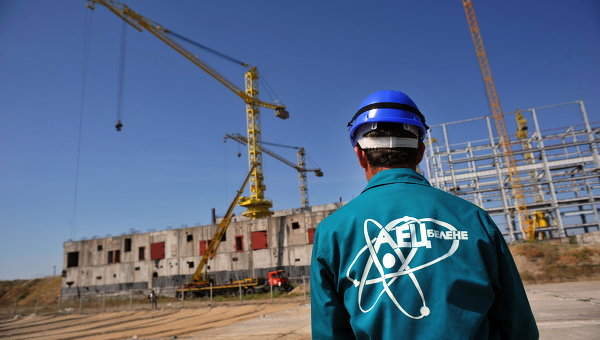
The Perpetual U-Turns in Bulgaria’s Nuclear Energy Policy
Publication: Eurasia Daily Monitor Volume: 10 Issue: 21
By:

After a January 27 referendum on the future of Bulgaria’s second nuclear power plant (NPP) failed to produce a binding result, Sofia announced in a letter to the European Commission its decision to instead construct a new 1,000-megawatt (MW) reactor at the existing Kozloduy NPP (dnes.bg, February 2). Russian state company Atomstroyexport, a subsidiary of Rosatom, has already produced the nuclear reactor, which was initially designated for the second nuclear power plant near the city of Belene on the Danube River.
The Belene NPP project started in the 1980s during the Communist era and underwent several suspensions and revivals over the past twenty years, until the current government finally abandoned it in March 2012, identifying it as economically “unfeasible.” Last week’s failed referendum, however, is unlikely to be the end of the Belene NPP project, which has been a contentious issue between Sofia and Moscow, as well as among political parties in Bulgaria.
The referendum resulted from a petition organized by the opposition Bulgarian Socialist Party (BSP) after the center-right government of Prime Minister Boyko Borissov cancelled plans for the construction of the Belene NPP. The Socialist party collected 770,000 signatures in the summer of 2012 to petition parliament for a plebiscite. Bulgarian citizens were supposed to answer “yes” or “no” to the question: “Should nuclear energy be developed in Bulgaria through the construction of a new nuclear power plant?” The referendum, however, turned into a fiasco with a very low turnout, invalidating the result. According to the Bulgarian law on referenda, the poll would have been legally binding if over 4,225,124 voters participated—as many as those who took part in the last parliamentary elections in July 2009—and if more than half of them voted “yes.”
Despite the heated debate regarding the Belene NPP between the political parties and in the media, the public appeared disinterested in participating in the referendum. Only 20.2 percent of registered voters showed up at the polling stations, with 61 percent of them supporting a new nuclear power plant, and 38 percent voting against (BTA, Dnevnik, Trud, 24 Chasa, mediapool.bg, January 29). Although the result of the poll is not valid, the decision will be referred to parliament, since more than 20 percent of registered voters in the country cast their ballots. Prime Minister Borissov immediately stated that the ruling majority would vote against the second nuclear power plant, because it deems it unprofitable (Trud, Capital, January 28). But the legal provision giving the parliament the right to make the final decision also leaves the possibility of reopening the issue and restarting the project by a future parliament dominated by the Socialists.
At the time the Belene NPP was cancelled, Atomstroyexport had already built one of the two nuclear reactors with a capacity of 1,000 MW. Six months later, the company stated it had produced the second reactor as well, claiming the Bulgarian government failed to officially inform the company of the contract’s cancellation. Subsequently, Rosatom filed a lawsuit against Bulgaria at the International Arbitration Court in Paris, requesting one billion euros ($1.3 billion) in damages (BTA, Trud, September 11, 2012; see EDM, September 17, 2012). It is not clear whether the recent decision to instead install the Russian reactor at Kozloduy NPP will help resolve the legal dispute between Rosatom and Bulgarian Energy Holding.
At a press conference after the referendum, Bulgarian Economy and Energy Minister Delyan Dobrev called the decision to install a new reactor at Kozloduy NPP “economically logical.” He added that Bulgaria currently has 11,800 MW of electricity production capacity while its maximum consumption of electricity is 6,300 MW. “Right now, half of the reactors at the thermo-power plants in the Maritsa East Complex are turned off. We are exporting about 1,300 MW, and there is no more demand that we can use for electricity exports,” Dobrev explained (Focus News Agency, January 27). Earlier, Bulat Nigmatulin, former Russian deputy minister for atomic energy (1998–2002), told the Bulgarian ad-hoc parliamentary committee investigating dealings under the Belene project: “The referendum can serve some political purposes, but it cannot solve the future of the Belene NPP, which is now unprofitable, unnecessary and there is no money for it” (mediapool.bg, January 24).
This realistic assessment is unlikely to be heard by the Bulgarian Socialist Party, which according to recent opinion polls may obtain a more influential position in the next parliament. The former energy minister in the Socialist-led government (2005–2007), Rumen Ovcharov, has already declared: “This government will be gone, and the next one will restart the nuclear power plant at Belene” (Dnevnik, January 22).
In another twist, just days after his statement, Ovcharov was publically implicated in a corruption scandal when the parliamentary committee dealing with high-level corruption cases released all classified documents exposing trading influence and fraud in the energy sector. According to parliamentary committee chairman Yane Yanev, a wiretap made in the fall of 2006 revealed that Rumen Ovcharov, in his capacity as energy minister, had negotiated through Krasimir Georgiev, owner of the private consulting company “Frontier,” the purchase of nuclear fuel from Russia. On the tape, Georgiev could be heard saying he held several meetings with Ovcharov to align their ideas on a draft memorandum, ahead of the consultant’s talks with then Prime Minister Sergei Stanishev.
According to Yane Yanev from the conservative Order, Law and Justice Party, “The current leader of the BSP and of the Party of European Socialists, PES, and former Prime Minister Stanishev has negotiated secretly and behind the back of the European Commission [EC], through Ovcharov.” Yanev added, these were “illegal nuclear fuel deliveries since, effective January 1, 2007, the EC practically banned importing more than 20 percent of such fuel from Russia” (novinite.com, February 4). Evidently, the failed referendum will not put an end to the twists and turns in Bulgaria’s nuclear energy sector, which has been penetrated by corrupt deals for decades.




